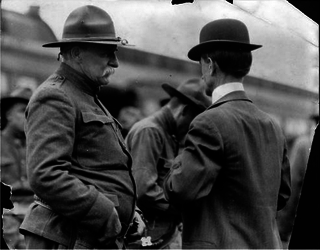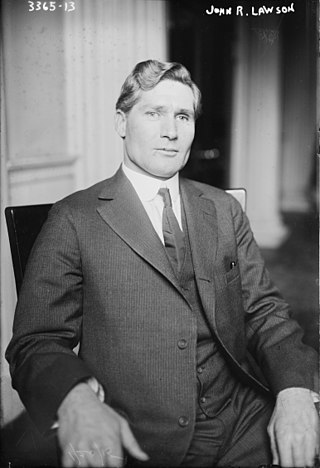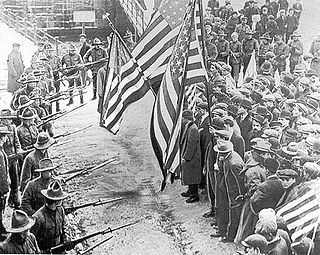
The City of Louisville is a home rule municipality located in southeastern Boulder County, Colorado, United States. The city population was 21,226 at the 2020 United States Census. Louisville began as a mining community in 1877, experienced a period of labor violence early in the 20th century, and transitioned to a suburban residential community when the mines closed in the 1950s.

Walsenburg is the Statutory City that is the county seat and the most populous municipality of Huerfano County, Colorado, United States. The city population was 3,049 at the 2020 census, down from 3,068 in 2010.

The Ludlow Massacre was a mass killing perpetrated by anti-striker militia during the Colorado Coalfield War. Soldiers from the Colorado National Guard and private guards employed by Colorado Fuel and Iron Company (CF&I) attacked a tent colony of roughly 1,200 striking coal miners and their families in Ludlow, Colorado, on April 20, 1914. Approximately 21 people, including miners' wives and children, were killed. John D. Rockefeller Jr., a part-owner of CF&I who had recently appeared before a United States congressional hearing on the strikes, was widely blamed for having orchestrated the massacre.

The region that is today the U.S. State of Colorado has been inhabited by Native Americans and their Paleoamerican ancestors for at least 13,500 years and possibly more than 37,000 years. The eastern edge of the Rocky Mountains was a major migration route that was important to the spread of early peoples throughout the Americas. The Lindenmeier site in Larimer County contains artifacts dating from approximately 8720 BCE.

Ludlow is a ghost town in Las Animas County, Colorado, United States. It was the site of the Ludlow Massacre–part of the Colorado Coalfield War–in 1914. The town site is located at the entrance to a canyon in the foothills of the Sangre de Cristo Mountains. It is located along the western side of Interstate 25 approximately 12 miles (19 km) north of the town of Trinidad. Nearby points of interest include the Ludlow Monument, a monument to the coal miners and their families who were killed in the 1914 massacre, the Hastings coke ovens, and the Victor American Hastings Mine Disaster Monument.

The Colorado Army National Guard is a component of the United States Army, United States National Guard, and Colorado National Guard. Nationwide, the Army National Guard comprises approximately one half of the US Army's available combat forces and approximately one third of its support organization. National coordination of various state National Guard units is maintained through the National Guard Bureau.

Frank J. Hayes was an American miner and president of the United Mine Workers of America (UMWA) from 1917 to 1919. A Democrat, he also served as Lieutenant Governor of Colorado in 1937–39.

The Colorado Labor Wars were a series of labor strikes in 1903 and 1904 in the U.S. state of Colorado, by gold and silver miners and mill workers represented by the Western Federation of Miners (WFM). Opposing the WFM were associations of mine owners and businessmen at each location, supported by the Colorado state government. The strikes were notable and controversial for the accompanying violence, and the imposition of martial law by the Colorado National Guard in order to put down the strikes.

Karl E. Linderfelt was a soldier, mine worker, soldier of fortune, and officer in the Colorado National Guard. He was reported to have been responsible for an attack upon, and the ultimate death of, strike leader Louis Tikas during the Ludlow Massacre. He was the son of librarian Klas August Linderfelt.
The Rocky Mountain Fuel Company was a coal mining company located in Colorado, operating mines in Louisville, Lafayette, and other locations northwest of Denver. The company also operated mines in Las Animas, Routt, Garfield and Gunnison counties. During the 1930s, the company was the second-largest producer of coal by volume in the state of Colorado. However, the company was severely impacted by the Great Depression, declining productivity of local coal deposits, and the increased popularity of natural gas, and went bankrupt in 1944.

The Colorado National Guard consists of the Colorado Army National Guard and Colorado Air National Guard, forming the state of Colorado's component to the United States National Guard. Founded in 1860, the Colorado National Guard falls under the Colorado Department of Military and Veterans Affairs.

John Chase was an American medical doctor and commander of the Colorado National Guard. He was the commander of the Colorado National Guard in several of the most significant confrontations between American military forces and organized labor — the Colorado Labor Wars of 1903–1904, Colorado Coalfield War, and the Ludlow Massacre of April 1914. He was a graduate of the University of Michigan where he played college football for the 1879 Michigan Wolverines football team, the first football team to represent the University of Michigan, and was captain of the 1880 team.

The Colorado Coalfield War was a major labor uprising in the southern and central Colorado Front Range between September 1913 and December 1914. Striking began in late summer 1913, organized by the United Mine Workers of America (UMWA) against the Rockefeller-owned Colorado Fuel and Iron (CF&I) after years of deadly working conditions and low pay. The strike was marred by targeted and indiscriminate attacks from both strikers and individuals hired by CF&I to defend its property. Fighting was focused in the southern coal-mining counties of Las Animas and Huerfano, where the Colorado and Southern railroad passed through Trinidad and Walsenburg. It followed the 1912 Northern Colorado Coalfield Strikes.

The Coal Wars were a series of armed labor conflicts in the United States, roughly between 1890 and 1930. Although they occurred mainly in the East, particularly in Appalachia, there was a significant amount of violence in Colorado after the turn of the century.

John Rankin Lawson was a Colorado union leader and businessman. He was the leader of District 15 of the United Mine Workers of America (UMWA) at the time of the Colorado Coalfield War and the Ludlow Massacre. He was convicted on May 3, 1915, of the murder of a deputy sheriff who died at Ludlow during the massacre at a trial held in Trinidad, Colorado and sentenced to life at hard labor, but freed on appeal to the Colorado Supreme Court in June 1917. He served as president of the Colorado Federation of Labor and on the International Executive Board of the United Mine Workers. He was a vice-president and director of the Rocky Mountain Fuel Company (CF&I).

Anti-union violence in the United States is physical force intended to harm union officials, union organizers, union members, union sympathizers, or their families. It has most commonly been used either during union organizing efforts, or during strikes. The aim most often is to prevent a union from forming, to destroy an existing union, or to reduce the effectiveness of a union or a particular strike action. If strikers prevent people or goods to enter or leave a workplace, violence may be used to allow people and goods to pass the picket line.

Primero is a ghost town in Las Animas County, Colorado, United States. The community was a company coal mining town for the Colorado Fuel and Iron Company during the early 20th century.

Patrick J. Hamrock (1860-1939) was an Irish-born American soldier who served in multiple conflicts as part of the U.S. Army and Colorado National Guard. He led a portion of the militia that participated in the Ludlow Massacre, part of the 1913-1914 Colorado Coalfield War. After the First World War, he served as Colorado’s Adjutant General and head of the Colorado Rangers.
Victor-American Fuel Company, also styled as the Victor Fuel Company, was a coal mining company, primarily focused on operations in the US states of Colorado and New Mexico during the first half of the Twentieth Century. Prior to a 1909 reorganization, the business was known as the American Fuel Company.

Berwind is a ghost town in Las Animas County, Colorado, nestled in Berwind Canyon 3.1 miles (5.0 km) southwest of Ludlow and 15 miles (24 km) northwest of Trinidad. The settlement was founded in 1888 as a company town for the Colorado Coal & Iron Company and, from 1892, was operated by the Colorado Fuel & Iron Company. It was a battle site in October 1913 and April 1914 during the Colorado Coalfield War, housing a Colorado National Guard encampment during the latter stages of the conflict.


















